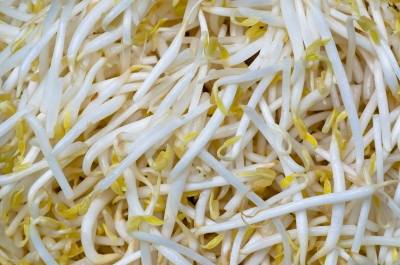
My current favorite news story is one by Reuters about an outbreak of e,coli in Germany attributed to organically grown bean sprouts with the ridiculous headline "E. Coli Outbreak Poses Questions for Organic Farming." Now it is absolutely true that there is a nasty outbreak of e.coli in Germany that has made thousands of of people sick, and caused 22 deaths. This is awful. But Reuter s has a little accuracy problem as it leaps to attack organic agriculture:
The warm, watery, organic growing environment suspected as the source of a deadly E.coli outbreak in Germany may produce delicious, nutritious bean sprouts, but is also an ideal breeding ground for the dangerous bacteria.
Bean sprouts are often prime suspects in E.coli outbreaks around the world, and health experts say it is no surprise the hunt for source of the lethal strain that has killed 22 people and made more than 2,200 sick has led to an organic bean farmer.
Some say the case raises questions about the future of organic growing methods.
"Bean sprouts are very frequently the cause of outbreaks on both sides of the Atlantic. They're very difficult to grow hygienically and you have to be so careful not to contaminate them," said Paul Hunter, a professor of public health at Britain's University of East Anglia.
"And organic farms, with all that they entail in terms of not using ordinary chemicals and non-organic fertilizers, carry an extra risk."
Problem the first – the WHO actually has no idea whether sprouts were involved – so far all indications have been negative. That doesn't mean a batch of organic sprouts couldn't have been contaminated – it is perfectly true that sprouts are particularly prone to bacterial growth whether organic or conventional – just that the statements of implied certainty in the article are nonsense.
On Tuesday, the EU health chief warned Germany against premature — and inaccurate — conclusions on the source of contaminated food. The comments by EU health chief John Dalli came only a day after he had defended the German investigators, saying they were under extreme pressure.
Dalli told the EU parliament in Strasbourg that information must be scientifically sound and foolproof before it becomes public.
In outbreaks, it is not unusual for certain foods to be suspected at first, then ruled out. In 2008 in the U.S., raw tomatoes were initially implicated in a nationwide salmonella outbreak. Consumers shunned tomatoes, costing the tomato industry millions. Weeks later, jalapeno peppers grown in Mexico were determined to be the cause.
In the current E. coli outbreak, tests are continuing on sprouts from an organic farm in northern Germany, but have so far come back negative,
Previously, imported Spanish conventional produce was implicated. I cannot find, however, any indication that Reuters ran an article arguing that the whole globalized food system was in jeopardy because important cucumbers might have been the source.
The second problem is that even if organic bean sprouts were the problem, this would have absolutely nothing do with the larger project of organic farming. Bean sprouts are not "farmed" in the same way that most food is farmed – they are instead kept in a warm, moist environment, almost always inside. They need stable, extremely warm temperatures – growing bean sprouts is a lot more like raising fish in an aquarium or hydroponics than it is like most organic farming. Observing that bean sprouts are a risk for carrying e.coli has absolutely nothing to do with organic agriculture in general.
There's also no statistical evidence that organic bean sprouts have sickened more people than conventional ones. The single largest e.coli outbreak in history, in Japan was linked to conventionally grown, industrial radish sprouts.The German outbreak is the second largest ever – and most of the next largest ones on the list are associated with two things – industrial beef or groundwater water contamination from nearby industrial animal production. And yet somehow, this never seems to raise questions or flags about the larger industrialized food system.
Article courtesy of Sharon Astyk
Image courtesy of hinnamsaisuy

